Four years ago, three new plays featuring Frederick Douglass opened in DC: The Raid from Theater Alliance, The Frederick Douglass Project from Solas Nua, and The Agitators from Mosaic. They were each terrific; I wrote rave reviews of them all. But none of them featured Anna, the Negro freewoman who arranged for Frederick’s escape from slavery. During their 44-year marriage, Anna bore Frederick five children, managed their household, and — as the magnificent new musical American Prophet now at Arena affirms — was the lifelong helpmeet without whom Frederick could never have had the freedom to become the man we now renown.
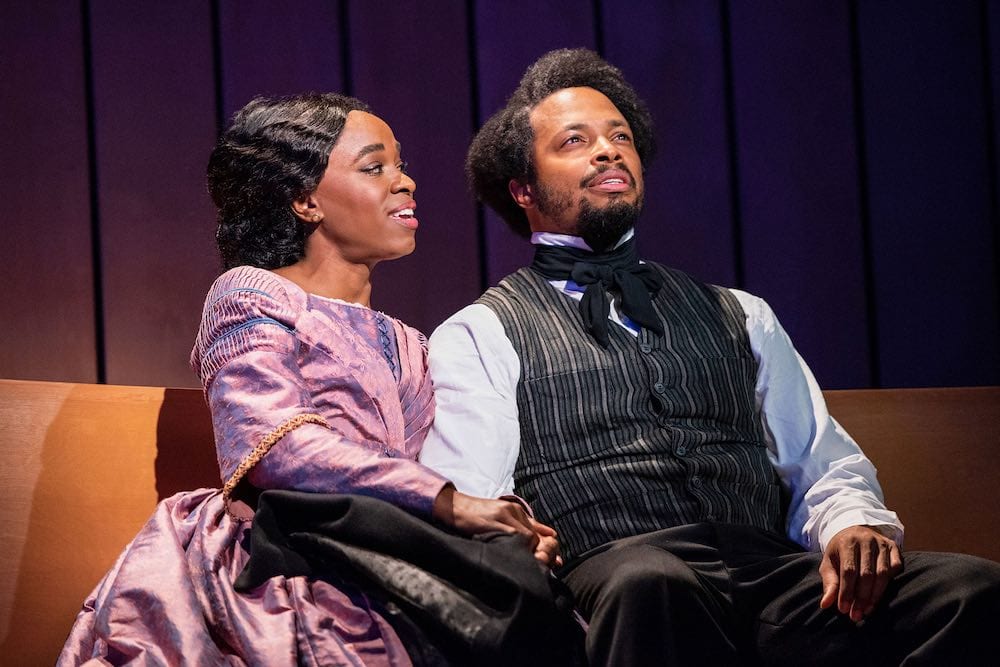
In life, Anna was disparaged — for not being able to read, for being darker skinned than Frederick — and in death, she has been dismissed by white historians. But the insightful and inspired authors of American Prophet — Charles Randolph-Wright (book) and Marcus Hummon (book, music, and lyrics) — have rescued Anna from the shadows of history and created a role that Kristolyn Lloyd performs so movingly you will feel Anna’s presence in Frederick’s heart and probably your own.
I could not stop thinking about Kristolyn’s performance as Anna. It had warmth, gravitas, passion, inner strength. She seemed to be channeling a woman with extraordinary historical significance and contemporary resonance, and I wanted to know more. I wanted to know the Anna that Kristolyn had come to know. In a delightful and deep Zoom conversation, punctuated by Kristolyn’s lilting laugh, I found out.
(This transcript has been edited for length and clarity.)
John: There’s a note in the program from Charles Randolph-Wright, the book writer and director, that says, “Because of poetry, lyricism, and music, we are able to go into Anna’s journey, which is key to Frederick’s journey… We were empowered to give Anna a voice.” How did you find Anna’s voice for yourself?
Kristolyn: I’m a big believer in ancestral recognition. I have a practice of allowing the ancestors to join in the process because they’re so vibrant, and their presence is so felt. Before every show, I invite Anna into the performance because it’s her story. There’s nothing else for me to do in this moment except be a vessel. And Marcus [Hummon] gave me a very helpful book by Anna’s daughter Rosetta: Anna Murray Douglass, My Mother As I Recall Her.
Once I read that book it was very clear to me why white historians had written about Anna the way that they have: She was the backbone for Frederick and she’s what kept his abolitionist ship afloat. What Black woman in that position had room for niceties? She was busy, and she was very protective of her family. Anna and Frederick had some of the most eclectic people pass through their home, and I can understand that she would want boundaries of some sort in order to keep a sense of home life and domesticity alive while they’re in the midst of trying to save the race.
Anna and Frederick met at a meeting of the East Baltimore Mental Improvement Society, and in American Prophet, that scene is played to a beautiful song they sing together, “Children of the Same River.” [See video below.] Their cautious waltz is choreographed in a very stylized way such that Anna and Frederick almost touch but don’t — until the song’s end. Would you talk about that breathtaking moment of musicality and physicality?
We found that through our intimacy coordinator, Kaja Dunn. Her work allowed us to have a safe exploration of what is their connection, how does their intimacy look? You use your hands to let your counterpart know what places are safe to touch and explore. We found that there was something very exciting about the spatial relationship between Frederick and Anna before they actually touch at the end of the waltz. It felt very apropos for that time period when where you place your hands on a woman is very indicative of your relationship to her.
It reads today like intimacy with respect — and we get a sense of Anna’s strength and presence.
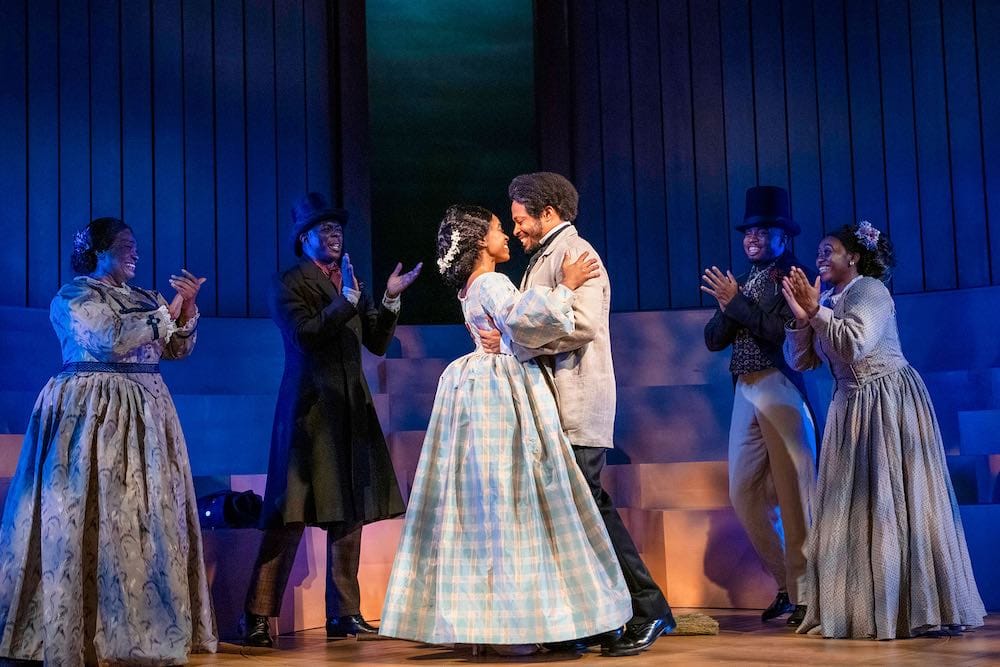
Later, because of the outside threat to their lives and their love, they can’t even reveal to friends and family that they’re married, and American Prophet dramatizes how Anna helped Frederick escape from Baltimore to New York, a free state, wearing a sailor disguise she made for him. At one powerful point she says to him:
ANNA:
You will be free. My children will not have a
slave for a father.
You are not a slave. Carry that with you, Frederick.
You are not a slave.
Would you talk about Anna’s role at that critical juncture in Frederick’s life and how those words resonate today?
She was already doing abolitionist work before she met him, even before he began his abolitionist work. I’m always struck by that moment because a woman who’s able to emotionally regulate this man in a moment of high panic is a woman that is formidable. I imagine that in moments like that, Frederick fell more in love with her — just the ability to look at this woman and say, Man, I need her and she can show up when necessary. So it is hitting me very deeply when I’m telling him: Carry that with you as you’re making your way to New York and back to me. You are not a slave, regardless of what they call you, regardless of their perception of you, that is not who you are. That is not how I see you.
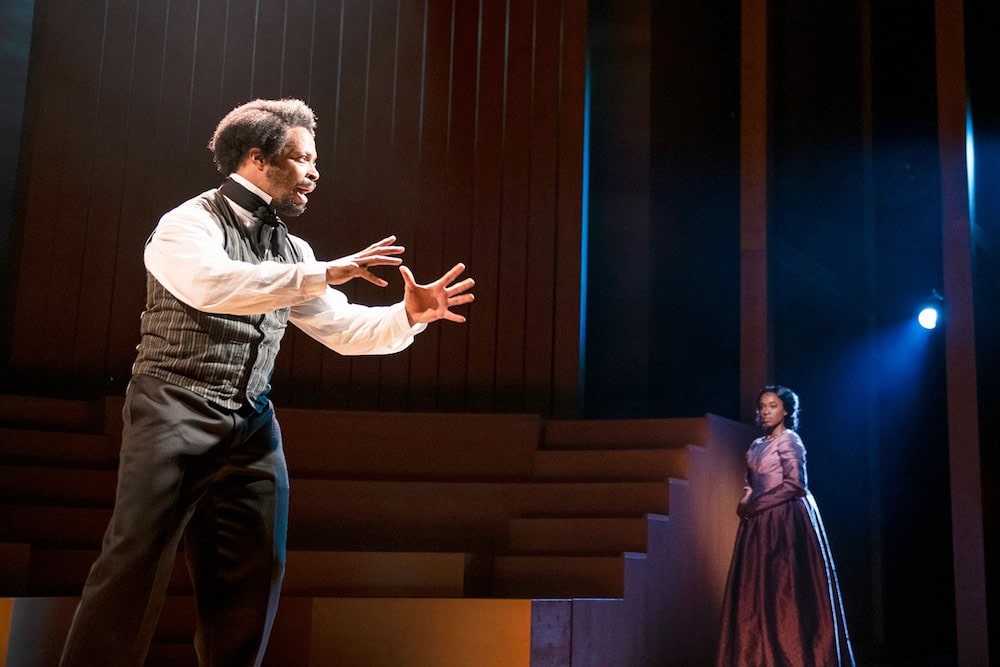
There comes another point in Anna’s journey when Frederick is living in the spotlight and she’s living in his shadow, and that’s dramatized in American Prophet in a song called “A Name,” when Anna sings:
ANNA:
A WOMAN LEAVES HER NAME BEHIND
TO CLEAVE TO A MAN
WITH WHOM SHE ABIDES
MY HUSBAND’S NAME WILL WELL BE REMEMBERED
BUT WILL MINE?
How did singing that feel to you?
It always feels like a really important secret between her and the audience. I don’t know how often she vocalized that to her husband or the people around her who were supporting her and Frederick in the movement. So it always feels to me like a really lovely secret that the audience gets to hear from Anna, that nobody else in the play is going to get to hear. And it has a lot of importance to me to be able to say those words as a 2022 woman playing this woman from the 1800s; it feels very exciting to be able to voice that desire of hers.
Her dedication to him, and her support for him, is so solid throughout the play. There’s that cliche “Behind every great man is a great woman,” but you rarely see how that works in everyday life. In American Prophet, we do. Anna handles their finances; she raises their children; she manages the household when he’s away. And at a point when he’s overcome with self-doubt, she sings, gorgeously:
ANNA:
IF YOU EVER LOSE YOUR WAY
I WILL BE YOUR STAR
YOU CAN LOOK UP INTO THE SKY AND FIND ME
THAT’S WHERE YOU ARE.
Anyone who’s ever had that kind of support from a woman in their life knows something very deep is happening there. Would you talk about that?
I love that song because Frederick is getting the opportunity to feel the love and support and strength of a woman that he probably hadn’t felt since he last saw his Grandma Bailey. It’s very exciting to get to sing that every night and serve the purpose of reigniting whatever fire needs to be reignited in him. It’s those private moments that you imagine happened between Martin and Coretta; and you imagine that these women, these wives, these partners in the struggle are how we have our Malcolms and our Medgar Evers —people that have made a mark in the civil rights struggle.
You mentioned Anna’s activist involvement in abolition and there’s a moment when her work with the underground railroad is made explicit.
SALLY: How do you manage it all?
ANNA: I manage it all by managing it all. My husband is battling with the minions of oppression, why not I endure hardship that my race may be free
It is moments like that when the sense comes through that Anna and Frederick are not only of the same river; they are in the same cause.
And they both endure hardships. Frederick is beaten up by a mob of men. Black men lose their lives for less, and here he is, an escaped slave, preaching against slave ownership. So “why not I endure hardship that my race may be free” feels like a foreshadowing for what’s about to come: Shortly after, they lose Annie, their youngest. She was only ten when she died. So I really allow Anna to enjoy her time on stage where she’s singing about her love for Frederick because what comes after is just so unimaginable.
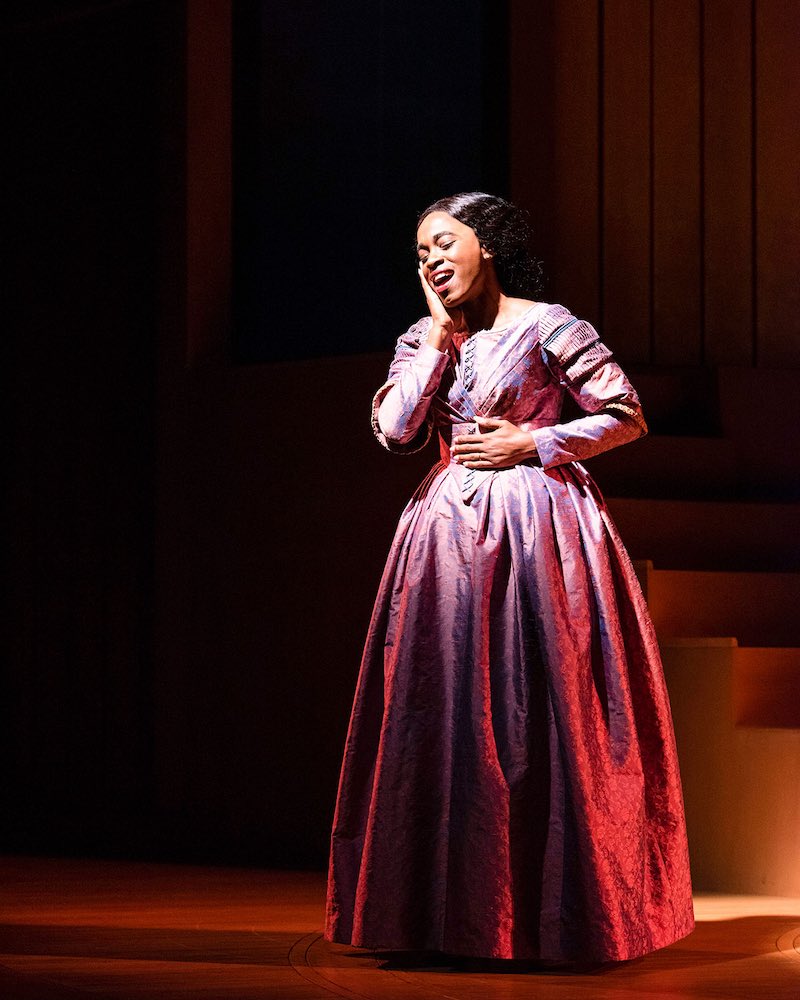
You have that song on stage alone, and your performance gives chills:
ANNA:
I LOVE A MAN
WHO COULD NOT STAND WITHOUT MY STRENGTH
I LOVE A MAN
DETERMINED TO CHANGE HISTORY
BUT PLEASE UNDERSTAND…
HE COULD NOT DO IT WITHOUT ME!
Who has Anna Murray Douglas become to you in the process of rehearsing and performing the role, and what do you hope audiences will see in her and hear from her?
Anna feels like a confidant in a lot of ways. Because I’ve gotten to know so many secrets about her, I have a feeling people are going to see the value in telling her story. I have a feeling there are going to be more renditions of it. I feel very honored to have gotten to trail-blaze this ancestor story.
I don’t know quite how to say this, but it’s like there’s a message to women of color in what you’re doing, in your character and your performance. And there’s also a message to men about who women can be in their lives.
That’s how I feel we’re going to be able to get progress in terms of racial reconciliation. We’re also going to have to ask ourselves really hard questions about gender reconciliation and how men and women exist together and are still allowed to live in their power, sensitivity, and vulnerability. bell hooks’ book The Will to Change: Men, Masculinity, and Love has been helpful in my feminist journey because it’s not about railing or raging in a way where it’s one against the other; it’s truly about coexistence. And so I love that you said it also feels like a message for men, because I do have a deep desire to reach that audience in a way that is encompassed with love.
American Prophet: Frederick Douglass in His Own Words plays through August 28, 2022, in the Kreeger Theater at Arena Stage, 1101 6th Street SW, Washington, DC. Tickets ($66–$115, depending on performance) may be purchased online, by calling 202-488-3300, or at the Arena Stage sales office Tuesday through Saturday from noon until 8 p.m. For information on programs such as pay-your-age tickets, student discounts, Southwest Nights, and hero’s discounts, visit arenastage.org/tickets/savings-programs.
Running Time: Two hours 15 minutes, including one 15-minute intermission.
The American Prophet program is online here.
GalaPro closed captioning is available.
COVID Safety: Photo identification and proof of vaccination against COVID-19 must be shown to enter the building and masks must be worn in the building. Arena’s complete safety protocols are here.
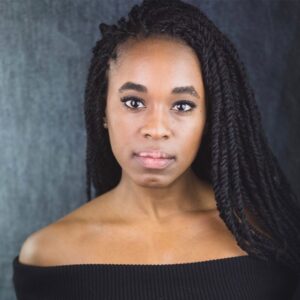
Kristolyn Lloyd is a Grammy and Emmy Award-winning actress. Her acting credits include Broadway: Dear Evan Hansen; Off-Broadway: Confederates, Paradise Blue, The Liquid Plain (Signature Theatre), Fairycakes (Greenwich House Theater), Little Women (Primary Stages), Blue Ridge (Atlantic), Hamlet (The Public Theater), Invisible Thread, Dear Evan Hansen (Second Stage Theater), Heathers The Musical (New World Stages), Cabin in the Sky (Encores! City Center); Selected Regional: Paradise Blue (Williamstown), Witness Uganda (A.R.T.), Hairspray, Rent (Hollywood Bowl); TV: Random Acts of Flyness (HBO), Elementary, Madam Secretary, Kevin Can Wait (CBS), ER (NBC), Lie to Me. Instagram and Twitter: @kristolynlloyd
American Prophet: Frederick Douglass in His Own Words
Book by Charles Randolph-Wright and Marcus Hummon
Music and Lyrics by Marcus Hummon
Directed by Charles Randolph-Wright
Choreographed by Lorna Ventura
Music Direction, Orchestrations, and Additional Arrangements by Joseph Joubert
SEE ALSO:
Unforgettably powerful ‘American Prophet’ is on fire at Arena (review by Bob Ashby)
Arena Stage announces 2022/23 season, Molly Smith’s 25th as artistic director





Thank you for writing this! I saw the show last weekend, and was blown away by both the role and its performance. Kristolyn Lloyd is an incredibly talented actor. Her strength made me wish that the play had not ended with Lincoln, but instead had completed the Douglass arc.